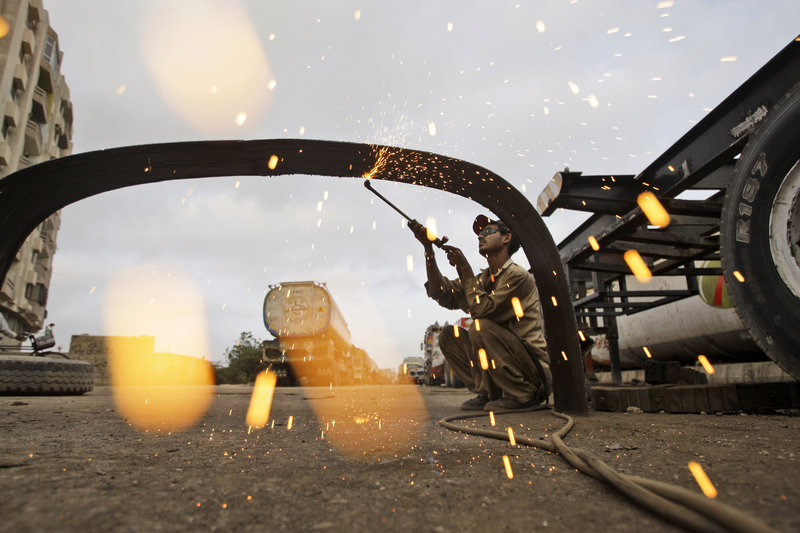WASHINGTON — Ending a bitter seven-month standoff, Secretary of State Hillary Clinton apologized to Pakistan on Tuesday for the killing of 24 Pakistani troops last fall and won in return the reopening of critical NATO supply lines into Afghanistan. The agreement could save the U.S. hundreds of millions of dollars in war costs.
Resolution of the dispute also bandages a relationship with Pakistan that will be crucial in stabilizing the region. The ties have been torn in the past year and a half by everything from a CIA contractor who killed two Pakistanis to the unilateral U.S. raid on Osama bin Laden’s Pakistan compound.
THE RISKS OF SAYING ‘SORRY’
But the accord carries risks for both governments – threatening to make Pakistan’s already fragile civilian leadership look weak and subservient to the United States while offering fodder to Republicans, including presidential candidate Mitt Romney, who contend that President Obama says “sorry” too easily.
The first trucks carrying NATO goods should move across the border today, U.S. officials said. It could take days to ramp up supplies to pre-attack levels, but around two dozen impatient truck drivers celebrated the news in a parking lot in the southern city of Karachi by singing, dancing and drumming on empty fuel cans.
“We are sorry for the losses suffered by the Pakistani military,” Clinton said, recounting a telephone conversation she had with Pakistani Foreign Minister Hina Rabbani Khar concerning the deaths that led Pakistan to close the supply routes. “I offered our sincere condolences to the families of the Pakistani soldiers who lost their lives. Foreign Minister Khar and I acknowledged the mistakes that resulted in the loss of Pakistani military lives.”
“I am pleased that Foreign Minister Khar has informed me that the ground supply lines into Afghanistan are opening,” Clinton added in her statement.
It marked the first time any U.S. official formally apologized for the deaths, a step hotly debated within the Obama administration and one demanded by Pakistan before it would reopen the supply routes.
OTHER DEMANDS IGNORED
Pakistani lawmakers also wanted Washington to halt all air strikes in the country and stop shipping weapons and ammunition to Afghanistan through Pakistani airspace, demands the U.S. has ignored. Negotiations stumbled at one point over transit fees Pakistan sought to charge.
The November incident was the deadliest among the allies in the decade-long fight against al-Qaida and other extremist groups along the Afghan-Pakistani frontier.
An American investigation found that Pakistani forces fired first and U.S. soldiers responded in self-defense. It blamed bad maps, poor coordination and Islamabad’s failure to provide the locations of its borders for the failure to determine if Pakistani forces were in the area. Pakistan argued that its troops shot at militants who were nowhere near coalition soldiers, and accused the U.S. of launching a deliberate attack.
The breakdown of the U.S.-Pakistani partnership arrived at an awful time, only weeks after Clinton and CIA Director David Petraeus went to Islamabad to patch up the relationship and secure a Pakistani commitment to snuff out support given by its intelligence services to the Taliban – support that Washington sees as a threat to the Afghan war effort.
The Obama administration, in an election year, expressed regret for the deaths but dug in its heels over the word “sorry,” fearful it might open the president to criticism from Republicans already critical of Pakistan’s links with militants fighting in Afghanistan.
BUT WHAT ABOUT HAQQANI?
It is also unclear what the apology will mean for the U.S. call for Pakistan to crack down on the militant Haqqani network, which is believed to use Pakistan as a rear base for attacks on American troops in Afghanistan.
Having titled his campaign book, “No Apology,” Romney accuses Obama of having gone “around the world and apologized for America.”
The accusation refers to Obama’s trip to Cairo early in his presidency, when he sought to repair U.S. relations with the Muslim world. Clinton’s remarks made no reference to an “apology,” though she did use the word “sorry.”
Obama made no comments about Pakistan on Tuesday.”The main thing is that a superpower has acknowledged our principled stance, and they have shown flexibility,” said Information Minister Qamar Zaman Kaira. “It was not the issue of money. It was the issue of our sovereignty.” He added that Pakistan was assured there would be no repeat of the incident.
Send questions/comments to the editors.



Success. Please wait for the page to reload. If the page does not reload within 5 seconds, please refresh the page.
Enter your email and password to access comments.
Hi, to comment on stories you must . This profile is in addition to your subscription and website login.
Already have a commenting profile? .
Invalid username/password.
Please check your email to confirm and complete your registration.
Only subscribers are eligible to post comments. Please subscribe or login first for digital access. Here’s why.
Use the form below to reset your password. When you've submitted your account email, we will send an email with a reset code.